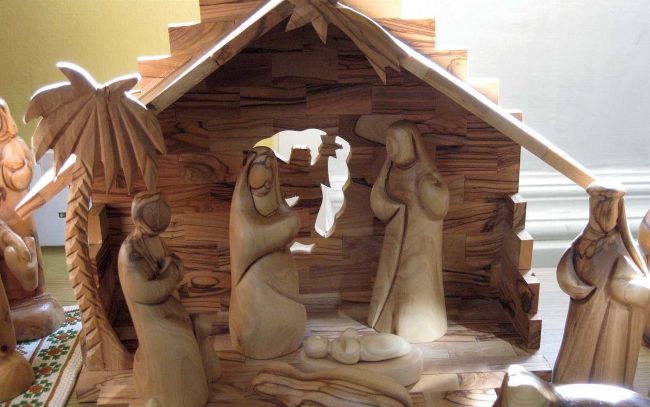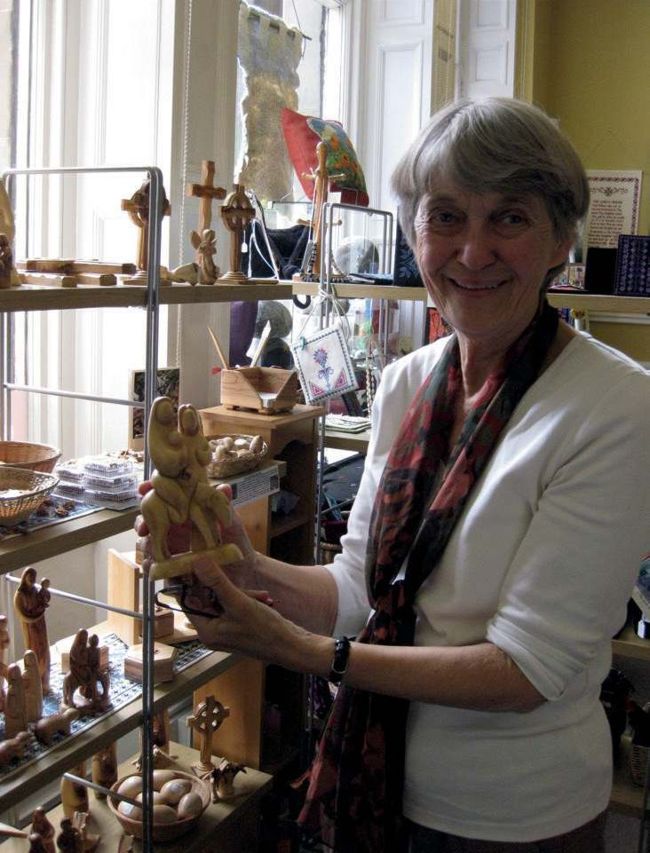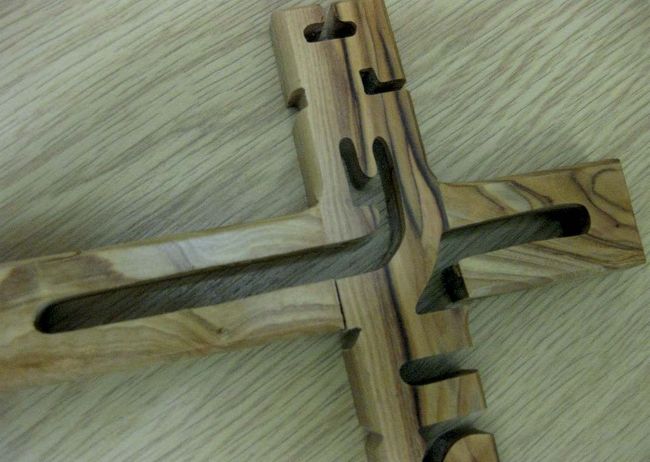From holy land to advent centrepiece
Jackie Macadam traces the journey of a Christmas crib, from a Holy Land olive grove, to sale in an Edinburgh shop.
COVER

The nativity scene carved from the olive wood
THE old tree had been growing in an olive grove on the West Bank of the Jordan River for generations. Twisted and gnarled, thanks to careful pruning of wizened branches it still produced the olives the grove was known for.
Pruning has to be done regularly to keep the trees at their best, but being precious olive wood, nothing is wasted.
The wood taken from the olive tree had a long journey to make – all the way to Edinburgh and beyond in fact.
“The olive tree has a huge symbolic value for Palestinians,” says Carol Morton, one of the volunteers who works at Hadeel, the shop at 123 George Street, Edinburgh (next to the Church of Scotland offices) that sells Palestinian Fair Trade goods.
“The tree has roots that go very deep into the ground and provides shelter, food and nourishment, warmth and often a source of income for the people who live there.”
It seems appropriate that some of the best-selling items in the shop are beautifully carved nativity sets created from the wood of trees grown in the Holy Land.
Carol explains: “Our nativity display was almost certainly born when an olive tree, somewhere in the hills in the northern West Bank, needed to be pruned. In the past some of the carvers have even been reduced to buying wood from trees which have been uprooted and destroyed for settlement building.
“The sets are beautiful, in different sizes but all a golden honey tone with a darker grain swooping round the carved cave and the holy figures inside, and it is into these that our olive tree is going to be carved.
“Olive trees represent hope, peace and tranquility traditionally, and the pruning of the olive groves is done annually. The wood from the pruned trees is collected and transported through the check points from the northern parts of the West Bank and southwards towards Bethlehem where they will lie and season until they are ready to be carved.”
She adds: “The wood has to be quarantined and aged for around three or four months after being treated to make sure it is not infected with any wood disease or bugs before being used for handcrafts.
“Piles of treated wood can often be seen in driveways leading to carvers, family workshops and small firms that use it for its beauty and much-needed income generation.”
After the wood from the tree has lain and weathered, and has passed its inspection, some of the wood will then be selected by workmen for its grain and size and then, using that, it’s decided what it would be best suited to make.
“After the initial selection, most of the chosen pieces will be put through a machine in a small factory used by quite a few carvers to take the harsh upper coats and bark off, and take the piece of wood down to a rough shape and size that will be more manageable for the hand carvers to work with,” says Carol.
“There are around 60 different hand carvers who work to produce the items we sell here in the shop.
“They work out of small studios in houses, cellars, even rooms underneath natural caves. Their tools can be handed down from father to son as are their skills. Women in the family too are involved, but more in the design and selling side. Some carvers specialise in the overall shape of a piece; some concentrate on the tiniest details that bring a piece to life.
“Many sell directly to tourists through shops in Manger Square – though tour groups often only have a short time in Palestinian areas to shop. Some guides take a large percentage commission, lowering the profitability for the artisans themselves, whose families are dependent on this income. In spite of these conditions, they can produce the most fabulous, intricate work.
“Our nativity scene will take days of steady and careful carving to produce. Cutting, smoothing, polishing, finishing – it’s all hand done and each piece is a little different from the next as a result.
“The nativity scene could well have been carved in a small cave or workshop perhaps attached to the home and would probably have been worked on by more than one artisan.
“The artists don’t just work on nativity scenes – they carve a variety of beautiful olivewood pieces, including crosses, ornaments and even experiment in special designs for Hadeel, such as the triquetra that the Very Rev Dr David Lunan gave out as gifts during his Moderatorial year.
“One carver would have started work on it, generally shaping and cutting until he was happy and then passed it to a more skilled carver who lovingly finishes the finer detailed work.
“Another new design, developed for the shop on Iona, is an olive wood heart with ‘Iona’ carefully etched on it. Olive wood hearts are sometimes used like a holding cross, especially for those who are not of the Christian faith. People in distress or difficult times find great comfort from the beauty and warmth of the natural wood.

Carol Morton with one of the carvings

Wood carving of a cross
“Having worked and polished the wood to make sure it would retain its lustre forever, the artisans deliver the finished piece to the local export Fair Trade business which helps to maintain prices for the workers and assure the quality which our customers so value,” says Carol.
The finished piece will be boxed and packed carefully and will then begin its journey through Israel, across the world to arrive in George Street in the heart of Edinburgh. It will be in a container with many other pieces from a variety of crafts groups and they’ll be destined to go to outlets across the UK.
“Working in this trade is very hard for Palestinians. Exporting, especially to Fair Trade businesses like ours, has become an essential part of their marketing strategy. Unfortunately, however, due to restrictions imposed on them, Palestinians are not allowed to simply export their goods directly, not even by mail.
“They need either to go through an agent who can move the goods out through Israel or for smaller orders, know the rare person who has a permit to enter Israel. Most of the goods go by plane, but heavier lots leave via boat usually from the Israeli port of Haifa, though it’s rare for our beautiful nativities to come this way because it takes too much time,” explains Carol.
Carol has close ties with the Palestinians she works with.
Carol’s husband was a Church of Scotland minister, the Rev Colin Morton. He was appointed minister at St. Andrew’s Church, Jerusalem, and Director of the Hospice (now Guest House) in 1988. They stayed for nearly ten years.
“The Christians there are Palestinians, so we did a lot of work with them,” she explains, adding: “Colin developed partnerships with the local Anglican Diocese and I helped organise a charity and Fair Trade shop, Sunbula. My experience of work as Regional Adviser with Traidcraft in the UK was invaluable. Sunbula’s and now Hadeel’s partners were not only co-operatives like the olive carvers, but almost more importantly, women’s organisations and those for people with special needs. Churches and other voluntary organisations help to set up projects to market products for women, whose main skill was traditional Palestinian cross stitch embroidery. Women had to become breadwinners when their husbands and sons were imprisoned, disabled, deported, even killed. For many of them it was the first time in their lives they’d had to take on that role. Embroidery was something which required no expensive infrastructure or machinery, and allowed women to carry on working in the field as well as caring for children.”
On its arrival in the UK, the packing container that holds the nativity pieces will be inspected by UK customs and Hadeel will get an import bill for the goods so that they can be released and unloaded.
“Unfortunately with the way the pound has plummeted in value since the Brexit referendum, everything is now around 20% more expensive for us, which is a real issue,” explained Carol.
“After being paid for and released and given to a delivery firm who will bring it onwards by road to Edinburgh, our volunteers will excitedly inspect each piece and process it to be put on display in the shop window here in Edinburgh and up for sale, or posted off to our internet and mail order customers. Through our website we receive orders and send goods all over the world. Our lovingly made nativity scene could be blessing the home of a family in Australia or a church in the States.
“When you think about it, it’s an incredible journey, all the way from a tree growing in the warm soil of the Holy Land to a small shop window here in winter-grey Edinburgh, touching so many people on the way,” says Carol. “Of course, it doesn’t always go as swimmingly as that would suggest!
“We do occasionally get the wrong thing here, something we perhaps didn’t order, but we’re a Fair Trade shop and we want to do our best for the people who make the goods, so we try to sell them.
“One such item that we were sent was a batch of crosses with ‘Jesus’ carved into it. They’re a bit ‘American’ for my personal taste but they’re a nicely carved item and I’m sure there will be takers.”
“Hadeel is owned by charity Palcrafts UK, and being a registered Fair Trade shop and importer, we try to work with specialised groups in particular,” she says.
“There’s a deaf society in Gaza that we buy from, and lots of young emerging artists with special needs get the chance to sell their goods through shops like ours. People with special needs gain confidence and even more than others empowered through their work, which is paid. Normally, for instance, a deaf woman in Gaza would rarely have left her camp and gone to work in a social enterprise.
“UNRWA, the United Nations Relief and Works Agency, which organises women’s centres in Gaza refugee camps, specialises in beautiful intricate hand done embroidery, but has no way to market it. Gazans are too poor to buy their own heritage now. Sales are further limited by the fact that tourists and pilgrims are not allowed to enter Gaza, much as the local people would like them to. So we try to fill the gap and help people in refugee camps get some income from their skills and keep hope and culture alive.
“Increasingly therapists and reformers also recognise the therapeutic value of ‘making something beautiful in a surprisingly unbeautiful location,’ as the author Tracy Chevalier has recently said about craft work in prisons in the UK. Some prisoners do embroidery, others work on quilts in a project called Cell Work.
When you think about it, it’s an incredible journey, all the way from a tree growing in the warm soil of The Holy Land to a small shop window here in winter-grey Edinburgh, touching so many people on the way.
“When you buy Fair Trade goods, like we sell here at Hadeel, you are not just buying a nice nativity set, or sterling silver necklace or a felt angel. You are paying to help a community survive.”